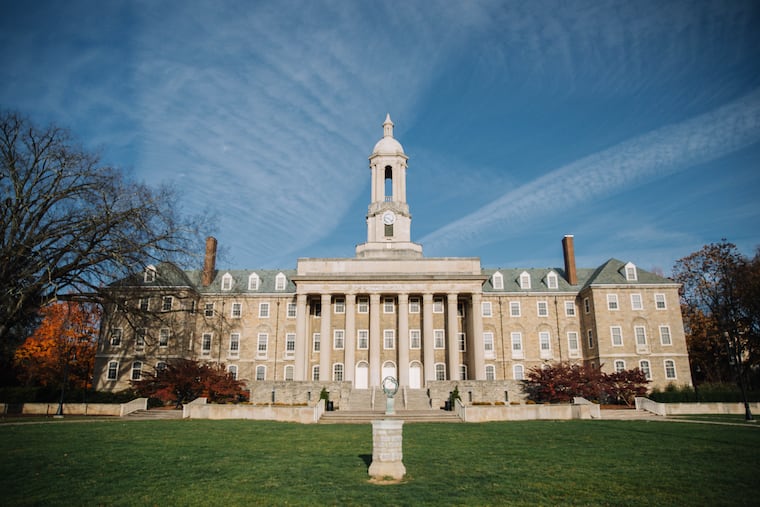Repeating its troubled racial history, Penn State once again resists real change
The cancellation of a planned center for racial justice is one of a series of missteps by the university's administration that have left “a void in Penn State’s soul.”

The quest for racial justice has once again been deferred at Pennsylvania State University.
The university’s deeply troubled racial past extends back decades. As a Black faculty member for the past 25 years, I have experienced and witnessed numerous incidents of racism — both institutional and personal — and my experience is far from unique.
In 2020 and 2021, I helped author a pair of reports that found that, among other things, more than 80% of Penn State’s Black faculty reported experiencing racism. These experiences cut to the core of the academic mission: scholarship, promotion, retention, collegial relations, service, and classroom interaction with students.
The result is a void in Penn State’s soul that affects every individual on each of its campuses, directly or indirectly.
The abysmal failure of Penn State’s highly touted 2020 Select Presidential Commission on Racism, Bias and Community Safety, formed by president Eric Barron after the murder of George Floyd, is but one example.
After two years of deliberations and a 15-page report with four major recommendations, Barron announced that the university would establish a Center for Racial Justice. This commission represented a modicum of hope, especially in light of the national reckoning on race.
Unfortunately, our hopes soon evaporated. Within months, Barron’s successor, Neeli Bendapudi, who came to Penn State by way of the Universities of Louisville and Kansas, decided to cancel the Center for Racial Justice, offering a litany of excuses that were as untimely as they were embarrassingly specious.
Many students, staff, and faculty took Bendapudi’s decision as the latest example of Penn State’s dishonorable legacy of false promises to promote racial justice and equity. More than 400 faculty members signed a petition protesting the center’s cancellation.
Bendapudi offered nothing to replace the canceled center. Nor has she implemented a single recommendation of the Barron commission. Apparently, a center dedicated to scientific and public policy research on racial justice was too “woke” and antithetical to the “Penn State brand.”
To make matters worse, Bendapudi has yet to publicly acknowledge a report she commissioned on the state of diversity, equity, inclusion, and belonging at the university, which was released in August. This sends the message that the president wants the report to receive as little public exposure as possible.
Furthermore, questions have been raised on campus about the extent to which the final report was edited by the administration before it was released, and whether whole sections that reflected poorly on the university in an earlier, confidential draft were censored or deleted. The report likely augers little change, to judge by the president’s reception — or non-reception — of it.
One is reminded of the biblical passage, “Though I speak with the tongues of men and of angels, and have not charity, I am become as sounding brass, or a tinkling cymbal.” Here, charity may be equated with verity of intent and action. The Bendapudi administration and the Penn State board of trustees have demonstrated that they lack both.
Many students, staff, and faculty took Bendapudi’s decision as the latest example of Penn State’s dishonorable legacy of false promises in promoting racial justice.
Bendapudi also has renamed the university’s Office of Affirmative Action, apparently to reflect the ultraconservative outlook of her administration when it comes to racial justice. Woe be unto anyone who files a serious complaint with the rebranded Office of Equal Opportunity and Access.
And in another episode, a prominent member of the Penn State board of trustees, the billionaire petroleum magnate Terry Pegula, was accused in a lawsuit of privately urging Black athletes who protest racial injustice to “go back to Africa.”
Pegula’s denial likely does little to reassure Black students, including athletes, and Black faculty members (many of whom were born in Africa) that they belong at Penn State and that Penn State belongs to them.
In addition to not offending one of its largest donors, perhaps the university’s silence on the “Pegula affair” is related to Bendapudi’s repeated declarations about First Amendment rights and free speech. This doctrine will be strongly tested in light of the return visit to Penn State’s campus later this month of a right-wing extremist spouting racism, antisemitism, homophobia, and misogyny under the ruse of “political comedy.”
Evidently, Penn State’s “silent night” culture of seeing no evil still reigns supreme and harks back to the horrific Jerry Sandusky scandal.
It is befuddling why any sound observer of Penn State’s approach to racial justice and inclusion would expect anything other than insanity: that is, doing the same thing over and over again and expecting different results.
Racial justice is hard work, especially in light of the national political climate, and many educational institutions are severely challenged. But it can be done if there is a will and committed leadership. Relying on a coterie of well-paid administrators, some of whom are products of — and integrally vested in — the culture of intransigence and excluding independent voices, will not yield different results.
As a great public university, Penn State owes the citizens of the commonwealth a credible game plan for advancing racial justice and inclusion. Its record so far is a dismal failure. The board of trustees and Bendapudi must take full responsibility. The faculty Senate leadership must eschew supplication. A great university can and must do better.
Gary King is a professor of behavioral health and African American studies at Penn State University.